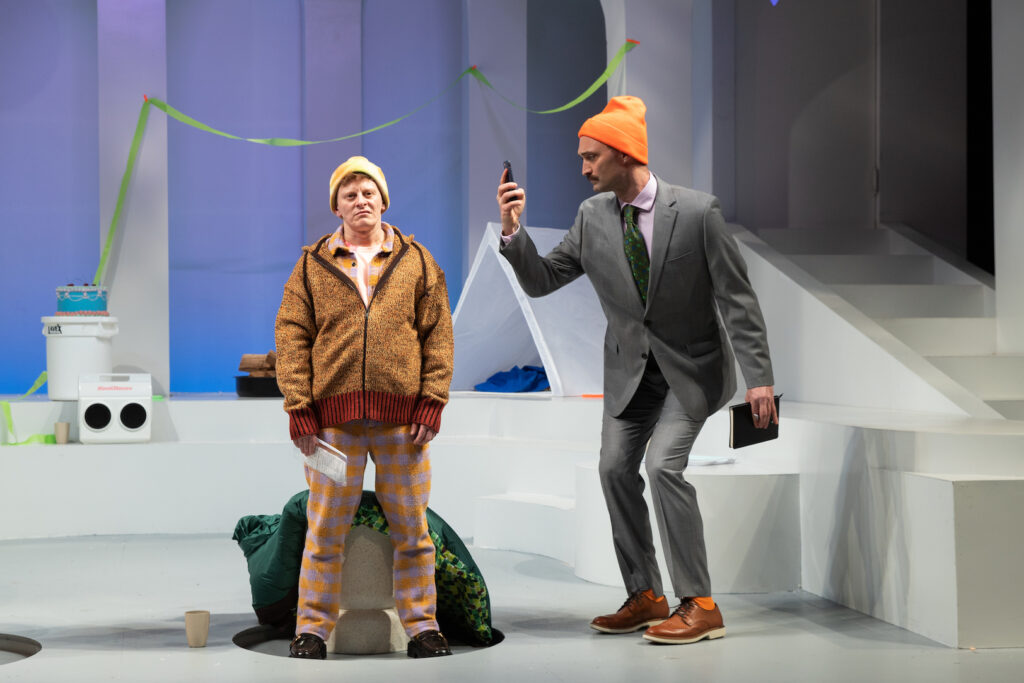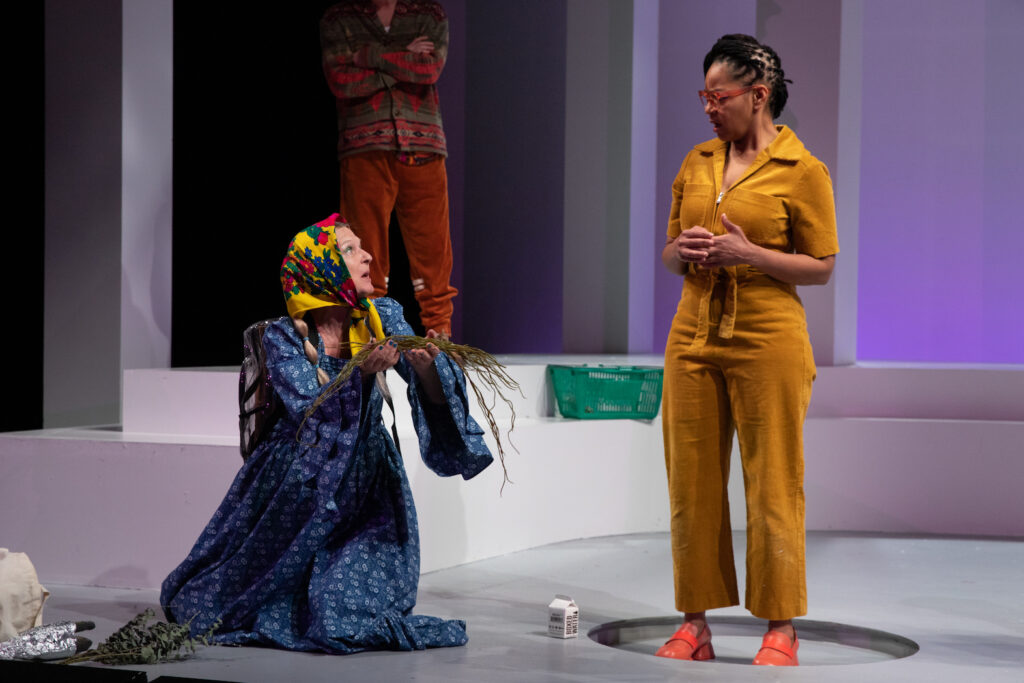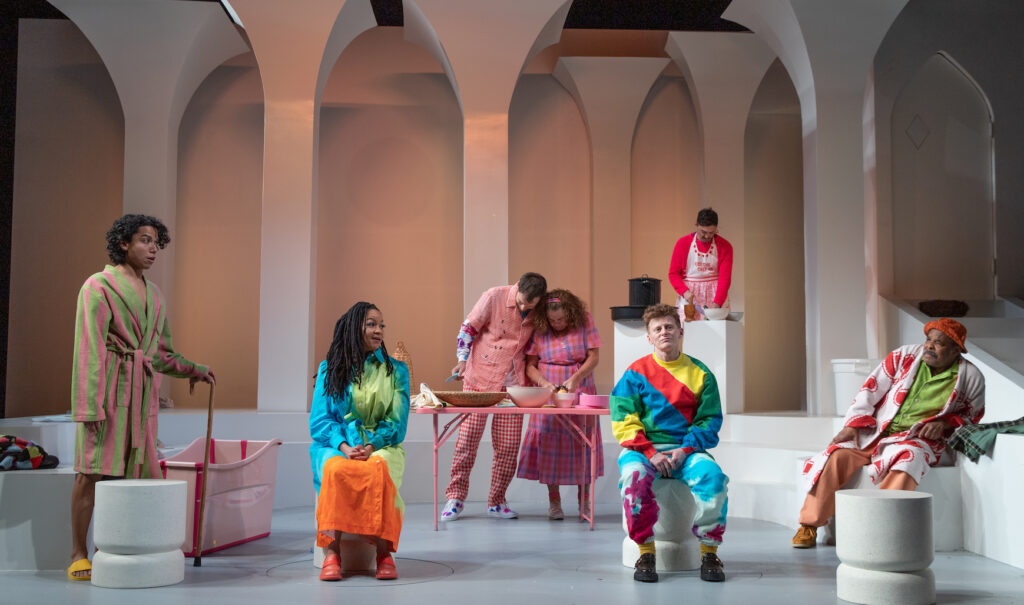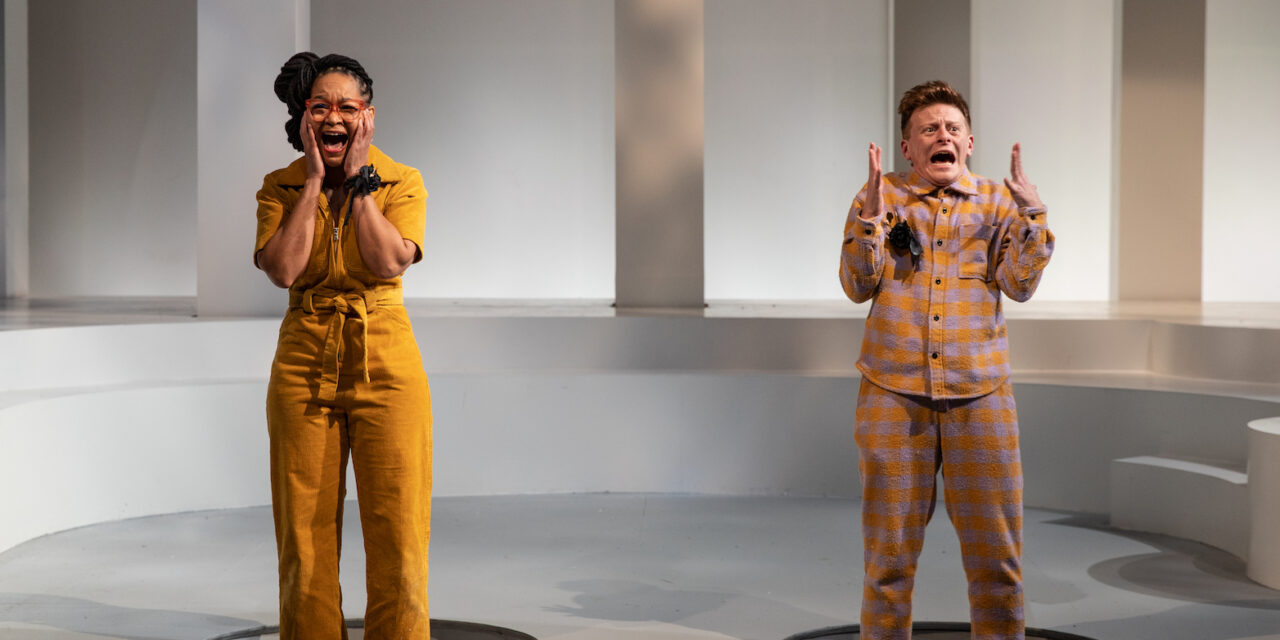By Stuart Miller . . .
In the opening moments of The Trees, siblings Sheila and David stumble drunkenly in a park outside their late father’s home. They fall asleep there and when they awake in the morning, they are stuck, their feet growing roots. Unable to move, they ultimately rely on a growing network of friends and strangers who, in turn, see them as the center of a back-to-the-earth community.
In a world where we are all constantly running around and where community ties seem to be dangerously fraying, Agnes Borinsky’s idea of the earth and nature stabilizing these people definitely strikes a chord. Unfortunately, while the opening scene feels Beckettian, this high-concept play never fully takes root.
As the woman behind me commented to her friend afterward, it’s like an elaborate wedding cake in the display window of a bakery—one that’s not for eating but is decorated cardboard. It may look like a gorgeous confection, but there’s nothing to really chew on.

In her playwright notes, Borinsky writes “I’m not great at writing plot,” and “It’s a mess in here.” Sadly, that’s true.
Logic seems to be in short supply throughout. Why would a plot revolve around a developer spending seven years trying to build a mall in a public park—aside from how unlikely it is that a nice Connecticut town would turn over public land for the project, no one is building malls these days. It’s a losing proposition. Efforts to fundraise an opposition also make no sense—the characters get worked up debating the offering of incentives on Kickstarter while ignoring the existence of incentive-free GoFundMe.
Even the final moment of the play feels contrived—everyone comes up with a reason to leave the stage to give Sheila and David a final conversation together and to reinforce how much they need their newfound community. But David’s ex-boyfriend Jared, who is cooking the soup for the party they’re having, tells them to watch it, despite knowing they can’t walk to the stove. His excuse for leaving is that he has to go call his fiancé . . . but, of course, like every modern citizen, he has a phone in his pocket so there’s no real reason for him to abandon his task and the siblings.


There are certainly good moments, and both Jess Barbagallo as David and especially Crystal A. Dickinson as Sheila gave game performances, even though David’s character is wildly inconsistent in his reactions to Jared (Sean Donovan) and the hustler-turned-mall-developer Terry (Sam Breslin Wright). His hostility to Sheila’s friend Charlotte (Becky Yamamoto), also doesn’t fit within the themes of the play.
The performances are equally inconsistent—Donovan plays Jared as a broad caricature, occasionally generating laughs but rarely connecting. Yamamoto is better but too breathless, while Wright finds a better balance, playing a heightened version of reality that’s usually amusing.
But even that doesn’t mesh with the humanely grounded turns by the rest of the cast: Max Gordon Moore as Saul (a rabbi who, over time, marries and has a child with Sheila); Nile Harris as Julian (who makes a documentary on the siblings but then leaves for med school, one of the many actions that make no sense and add nothing symbolically); Pauli Pontrelli as Tavish (who injures his leg rescuing the siblings’ grandmother from a fire); Ray Anthony Thomas as Norm (a gay man cruising the park, whose hedonism and idealism makes him the most interesting character); and Marcia DeBonis as Cheryl (a member of the rabbi’s former congregation who shows up late and adds little to the proceedings besides gluten-free cookies at a party).


Then there’s the mystical, Polish-speaking grandmother played by Danusia Trevino. Her presence adds nothing and scenes like the one where she seems to communicate with wolves that arrive one night seem like they’re dropped in from a different play.
An absurdist play can break from reality but it must do so with enough rigor that this imagined world has an internal logic. Beckett’s Endgame at Irish Rep does that brilliantly and is all the funnier and more powerful for it. The Trees ultimately can’t see the forest for the, well, you know . . .
The Trees. Through March 19 at Playwrights Horizons (416 West 42nd Street, between Ninth and Tenth Avenues). One hour 45 minutes with no intermission. www.playwrightshorizons.org
Photos: Chelcie Parry


















